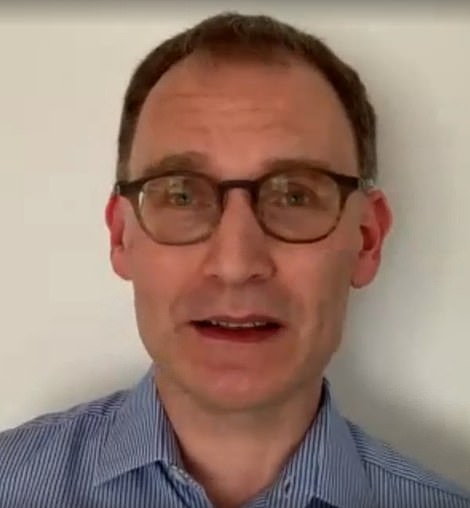
Professor Neil Ferguson said Scotland’s Covid cases may be beginning to plateau
Scotland’s Covid cases may already be plateauing barely a fortnight after the country’s schools returned from the summer holidays, ‘Professor Lockdown’ Neil Ferguson has said.
Cases more than doubled on the back of Scottish classes returning from the summer break on August 18 and there were fears the rest of the UK would be hit with a similar surge with millions of pupils heading back today.
But latest data from the UK Government’s Covid dashboard suggests that while case numbers are still very high in Scotland, they no longer appear to be growing.
The number of people testing positive nationally appears to have peaked at a record 7,113 on August 29, after surging from around 2,500 in the week schools went back.
But the seven-day average for infections — which rose to 6,000 on August 30 — is now hovering just below this level, in a sign the country’s outbreak may no longer be growing. Today Scotland recorded 7,065 cases.
Professor Ferguson — a SAGE adviser whose predictions of thousands of deaths spooked ministers into the first lockdown — said the data suggested ‘the hint of a plateau’ in infections.
It is an encouraging sign for the rest of the UK that suggests that even if other countries are hit hard with a big bang in cases over the first couple of weeks after schools return it will not be long lasting.
Professor Ferguson, an epidemiologist at Imperial College London, warned England had some ‘difficult weeks ahead’, however, because of the surge in cases predicted to hit over the winter months when the NHS is under the greatest pressure.
England has followed Scotland’s Covid trajectory this summer with cases spiralling in both countries following their national team’s success in the Euros.
As children head back to the classroom in England infections are 13 times higher than they were last September, when the end of the summer holidays then sparked the second wave.
It comes amid calls for 12 to 15-year-olds to be offered the Covid vaccine, with some SAGE advisers arguing that it would help to head off a surge in infections later this winter.
But others have argued it would be ethically dubious to inoculate the age group when millions of people in poorer countries are still waiting to be vaccinated.
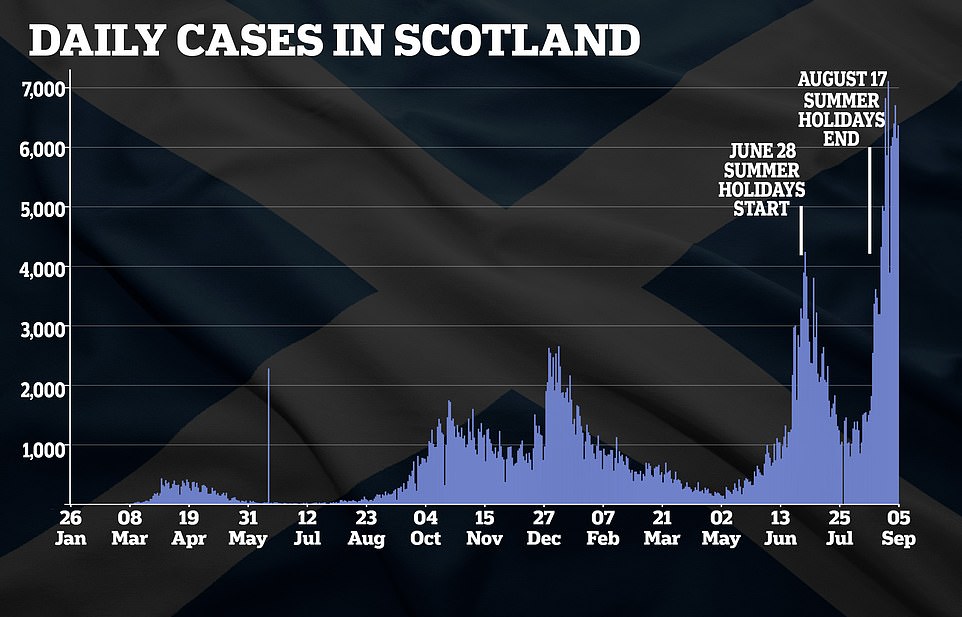
Data for the country showed its cases hit their peak on August 29 when 7,113 were recorded. But since then they have hovered at around 6,000 a day in a sure sign the country’s outbreak may no longer be growing
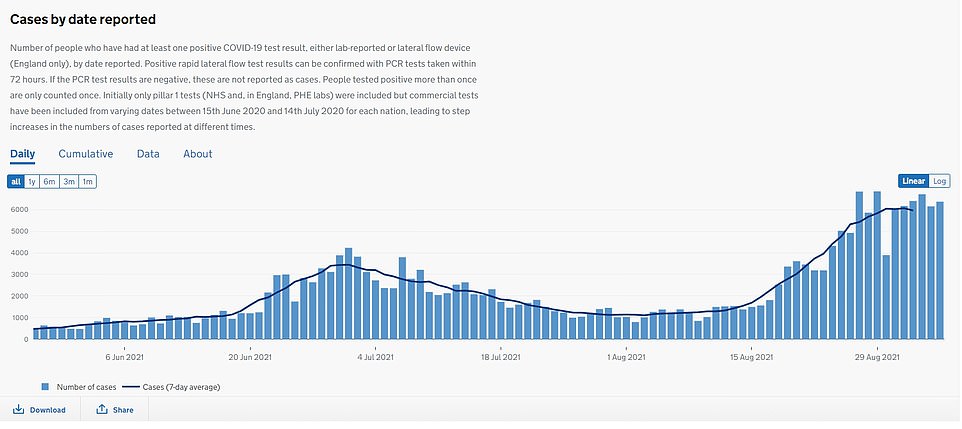
The above is a snip of Covid cases in Scotland since June by date recorded. It shows that the seven-day average for cases (blue line) now appears to have started to level off, in a sure sign the country’s outbreak is no longer growing.
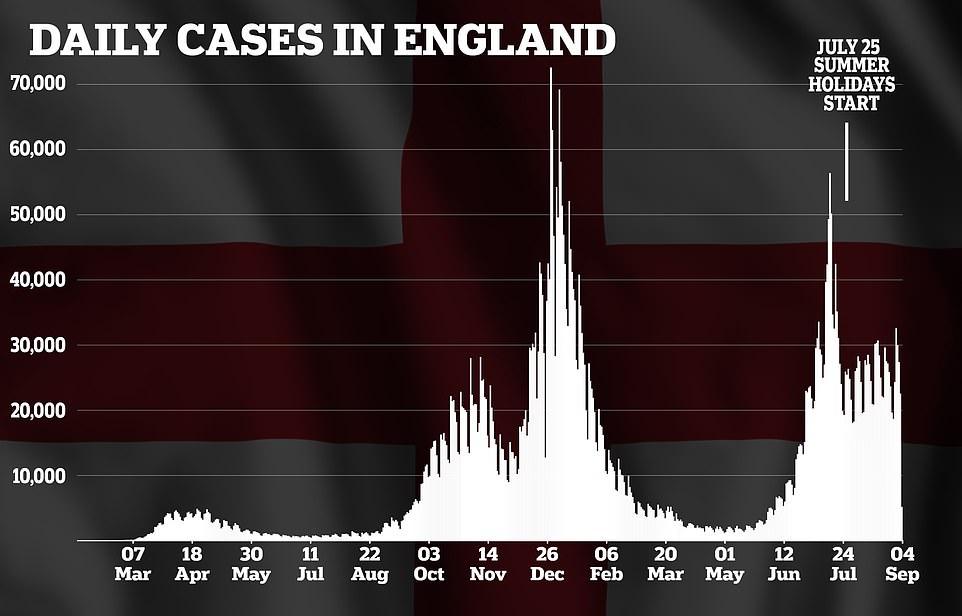
England’s Covid cases have plateaued over the last month ahead of schools returning, data shows. The country is currently recording around 26,000 new infections every day on average (pictured). Experts fear this will surge in the coming days, however, amid the return of schools
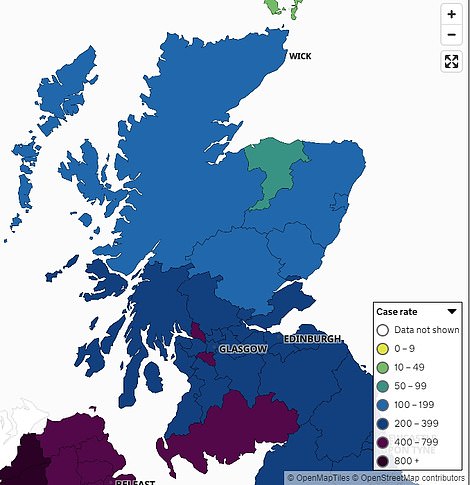
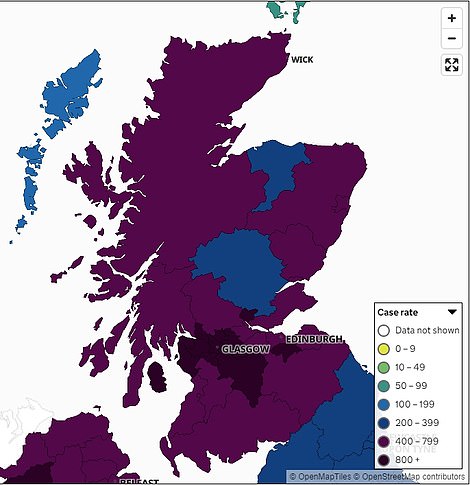
The above maps show the Covid infection rates in Scotland for the week ending August 18 (left), when schools went back, and September 1 (right), the latest available. Areas that are purple and dark purple have a higher Covid infection rate, while those which are blue and green have a lower Covid infection rate. The country has seen cases spiral since schools returned

COVID HOSPITALISATIONS IN SCOTLAND: The above graph shows the number of people in hospital suffering from Covid in Scotland (blue bars) and the seven-day average for the number of patients (blue line) since September last year. It shows hospitalisations have started to rise in recent days

COVID HOSPITALISATIONS IN ENGLAND: The above graph shows the number of people in hospital suffering from Covid in England (blue bars) and their seven-day average (blue line) since last September. The number of patients in hospital has remained steady
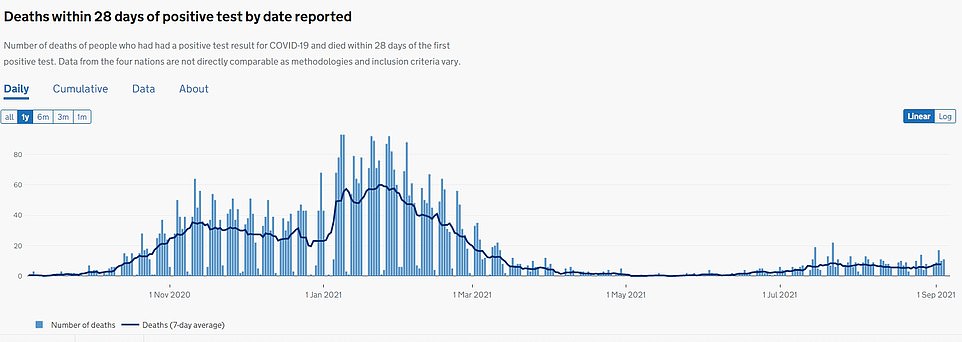
COVID DEATHS IN SCOTLAND: The above graph shows daily Covid deaths in Scotland over the past year by date reported (blue bars) and the seven-day average (blue line). It reveals deaths have only risen slightly
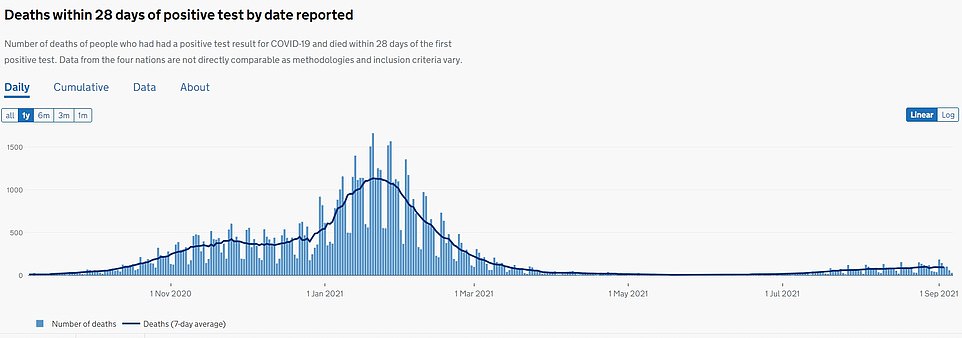
COVID DEATHS IN ENGLAND: The above graph shows daily Covid deaths in England over the past year by date reported (blue bars) and the seven-day average (blue line). It reveals they have only risen slightly compared to the second wave
Professor Ferguson told an event hosted by the Institute for Government: ‘I think we may see a difficult few weeks. Exactly how long that will go on for is unclear but maybe Scotland gives us some indication.
‘They reopened schools two weeks earlier than us and have seen case numbers slightly more than double there since they did.
‘(But) there’s a hint of a plateau now which may be good news.’
‘Professor Lockdown’ says he expects Chris Whitty to approve Covid vaccines for 12 to 15-year-olds
Britain is likely to press ahead with plans to vaccinate 12 to 15-year-olds, ‘Professor Lockdown’ Neil Ferguson suggested today.
The epidemiologist and SAGE adviser — whose modelling spooked ministers into the initial lockdown in March — said he expects Professor Christ Whitty and the other chief medical officers to approve the move.
The Government’s vaccine advisory panel said on Friday that it would not recommend jabs for children because Covid poses such a low threat to their health.
It left Professor Whitty and the other three chief medical officers from the devolved nations in the unprecedented position of weighing up whether to dish out jabs to the age group. MailOnline understands a decision is expected no later than Friday.
The Government has made no secret of the fact it wants to immunise secondary school-aged children after seeing cases spiral in Scotland when schools returned from the summer holidays last month.
Professor Ferguson from Imperial College London said today: ‘On balance, I think we will probably move to vaccinating 12 to 15-year-olds.
‘The question becomes even finer going into younger age groups, but focusing on teenage secondary school children I think we will move in that direction.’
He added: ‘It would not surprise me if the chief medical officers… would decide to go forward with vaccination (of 12 to 15-year-olds).’
The Joint Committee on Vaccination and Immunisation (JCVI) advises the Government on who should receive vaccines.
But the Scientific Advisory Group for Emergencies (SAGE), on the other hand, is responsible for advising ministers on responding to emergencies such as outbreaks of infectious diseases.
Scientists are divided over whether 12 to 15-year-olds should get the Covid vaccine, with some SAGE members backing the move yesterday arguing it would help to head off a surge in infections later this winter.
But others have argued it would be ethically dubious to inoculate the age group when millions of people in poorer countries are still waiting to be vaccinated.
Advertisement
He added: ‘I think most epidemilogists, scientists, advising the Government at the moment are expecting to see case numbers tick up.
‘But the really difficult thing now is predicting when the peak will be reached. And that’s because there is a lot of uncertainty in terms of details on the level of immunity in the population, given also people’s behaviour.’
The seven-day average for the number of daily Covid cases reported in Scotland has spiralled since children returned in mid-August, spiralling from 1,600 new cases a day when classrooms reopened to 6,000.
But the average has now stabalised at around 6,000 cases a day, suggesting the country’s outbreak is no longer growing exponentially but remains at high levels.
Experts fear Covid cases in England, Wales and Northern Ireland will also spiral in the coming days as children return to school from the summer holidays last week and this week.
In England and Northern Ireland infectiosn are currently flat with the countries reporting 26,000 and 1,300 cases a day on average, barely a change from last month.
But in Wales Covid cases have risen more than three-fold in the past month ahead of the return to school. There were more than 600 cases a day at the start of August, but now the country is averaging about 2,000.
Britain’s Covid cases shot up 56 per cent today because of a bank holiday dip, when people were less likely to get swabbed for the virus.
Latest data showed 41,192 people were registered as testing positive for the virus today.
There were also 45 deaths recorded, a fall of six per cent from last Monday.
Ministers have made no secret of the fact that they hope to immunise secondary school age children against Covid, after seeing cases spiral in Scotland when classrooms returned.
But Dr David Strain, the co-chair of the BMA Medical Academics, admitted this morning that rolling out doses to the age group would only cut transmission in the population by 20 per cent.
The Joint Committee on Vaccination and Immunisation (JCVI) – which is independent of Government – has now left the decision with Chris Whitty and the three other chief medical officers (CMOs) in the devolved nations.
They will meet this week to decide whether the broader societal benefits – including keeping schools open during winter – tip the balance in favour of jabbing children, with a decision expected by Friday.
But experts warn that clinicians will be ‘reluctant’ to give children jabs without parental consent because the JCVI has not recommended them for the age group.
Dr Strain, who is also clinical lead for Covid services at the Royal Devon & Exeter NHS Foundation Trust, told LBC Radio: ‘A lot of children aged 12 have enough maturity in order to make a decision themselves, although it’s not the same for every child.
‘Doctors and nurses are trained to be able to evaluate them and deem them competent.’
‘Vaccinating children will reduce the spread of the virus in the population by about 20 per cent.’
Speaking about his own family, he said: ‘My 16-year-old has already had the vaccine; our 12-year-old, who’s actually starting school tomorrow, will be desperately keen to get the vaccine.
‘We have weighed up the evidence and fully accept there is this very small risk of myocarditis after the first jab, but actually the risk of myocarditis after getting Covid is about the same, if not slightly higher.
‘These are the factors, so I would have no hesitation at all to allow my children to have the vaccine.’
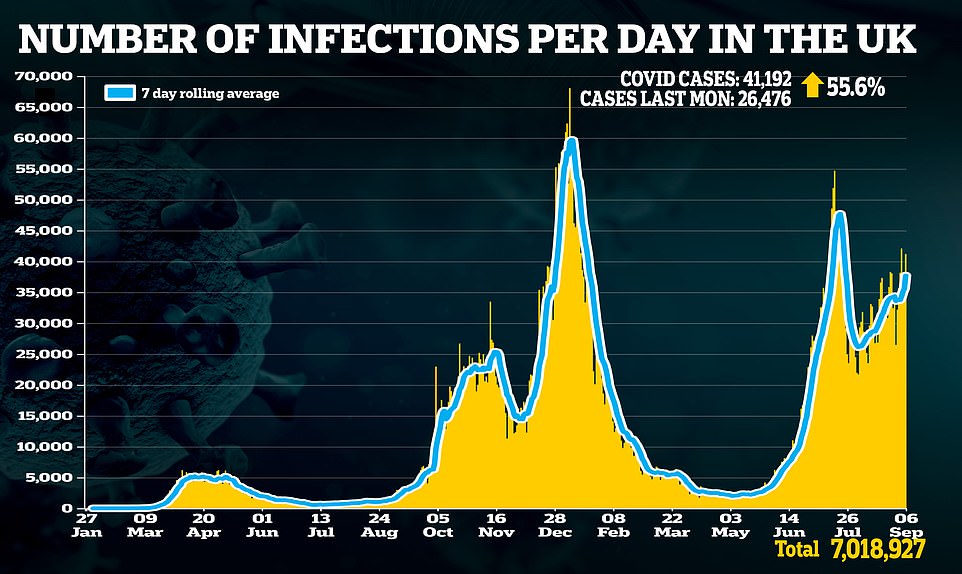
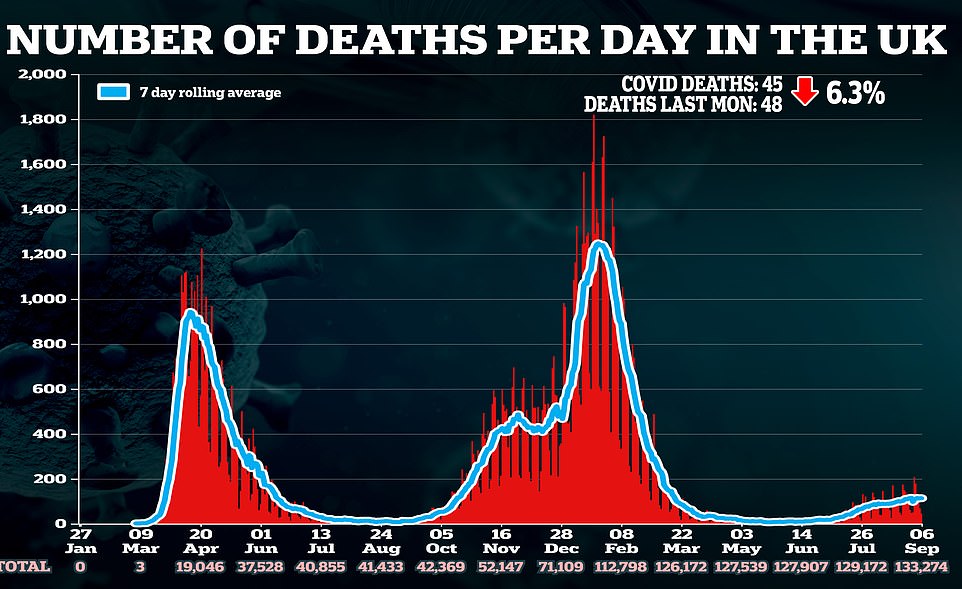
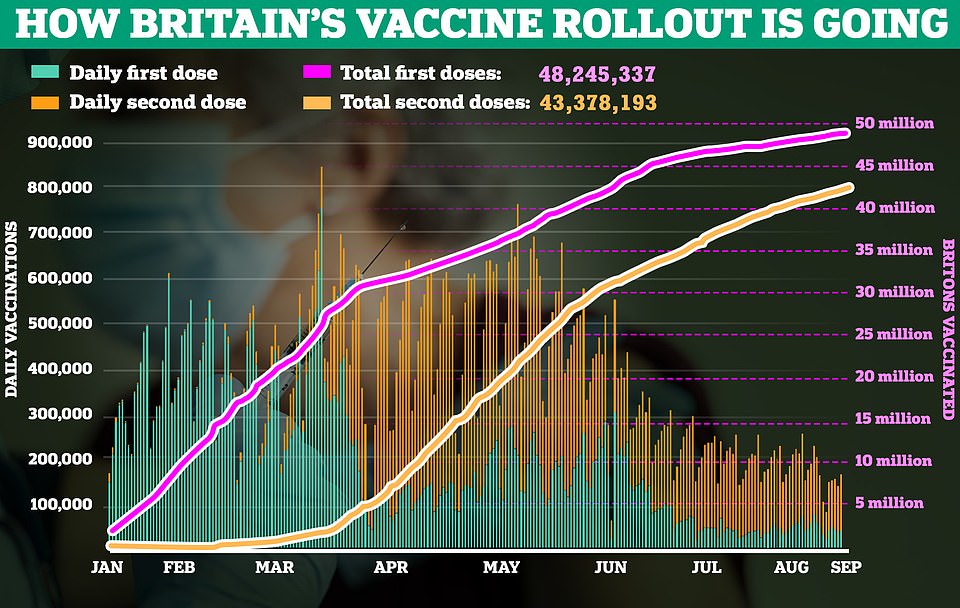
It comes as a survey suggets that a quarter of travellers from amber list countries broke Covid rules and di not take a PCR test after they arrived in the UK.
Some 23 per cent of amber arrivals in England in July either avoided staying at home when they were supposed to, or did not take required Covid tests on arrival.
The Office for National Statistics found compliance with the rules was lowest among those aged 18 to 34-years-old and highest among those who had not been jabbed.
It surveyed 848 adults arriving in England from amber territories between July 12 and 17. Overall, just 77 per cent of people said they followed both isolation and Covid testing rules, down from 82 per cent one month earlier.
Two in 10 people did not follow quarantine rules, while about one in 20 did not take the required tests.
Separate figures from the ONS revealed about half of Britons are fed up of the strict travel testing requirements, which may be leading to lower adherence.
Just 53 per cent of UK residents returning to the country after a holiday said they thought a Covid test was ‘very important for safety’.
Only around three in five respondents (49 per cent) said they fully understood the rules around quarantine.
The remaining 41 per cent said they had either misunderstood or were unsure of them.
Ministers have been accused of seeding confusion with the constantly changing amber list and uniquely strict testing requirements.
Source link : https://www.dailymail.co.uk/news/article-9962527/Professor-Lockdown-Neil-Ferguson-says-Scotlands-Covid-cases-plateauing.html











